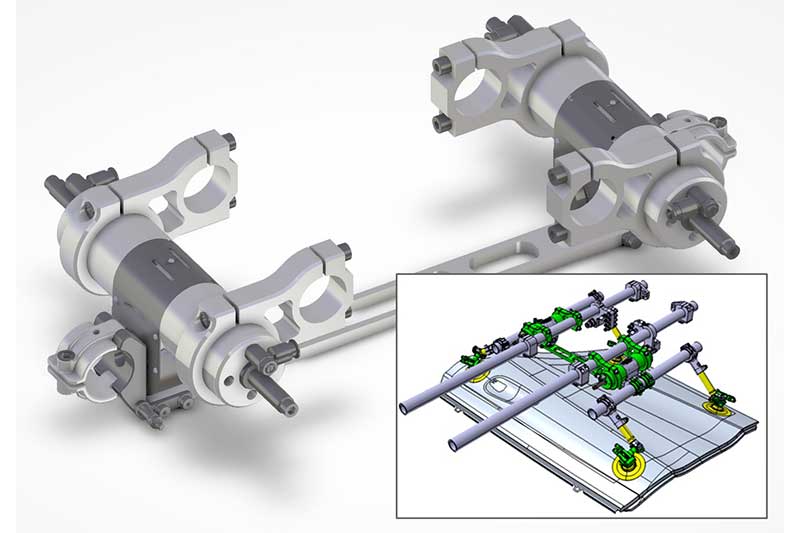We recently supplied all the tooling and storage carts for a new Schuler PXL stamping press installation at an automotive OEM facility in South America. The multi-station stamping line features 18 dies and nine crossbar robots, with Bilsing supplying the tooling for transferring parts between stamping stations; this included more than 324 grippers and over 1600 of its PFG vacuum cups, as well as 54 storage carts for holding.
The internal pre-assembly was built by the Bilsing Spain subsidiary using the pick positions defined in the 3D. Pre-assembly and tests of the overall tooling were done at the Bilsing Iberica facility. After packing of the tooling and transport to the plant in South America, it was set up for try-out with the PXL line on the plant floor.
“The partnership with our customer resulted in a launch of the PXL line, making it a reference and benchmark for other plants in Brazil,” said Anderson Franco, Bilsing manager, South America. “I’m proud of the Bilsing team’s ability to handle every aspect of this project and meet the result, quality and performance expected in terms of SPM of this new line.”
The new 2100-ton PXL line, which has numerous stamping stages, is located in a 100-meter area previously occupied by 27 old stamping presses. It has proven to be four times more productive than these previous presses — where the old presses took 12 to 14 minutes to stamp a part, the PXL accomplishes this in between two or three minutes. Plus, tooling and die changes are now completed in under five minutes, versus 45 minutes with the older process.
Newly acquired, Conbility Pre-Pro 3D automated tape placement and applicator machine for Advanced Fiber Placement (AFP) and Advanced Tape Laying (ATL) applications, expanding its footprint in the aviation industry. As manufacturers strive to reduce aircraft weight through production of composite structures, Bilsing plans to use this new machine for producing interior parts including galley, seat, and overhead bin components.
The Conbility PrePro system is capable of processing thermoplastic, thermoset and dry fiber placement and winding, including pre-impregnated semi-finished products known as prepregs with up to 50 mm tape tension control. A notable feature of the equipment its ability to directly produce complex, three- dimensional preform structures as well as tubular components. The advanced laser technology accommodates a wide range of process temperature.
This service is provided at Bilsing Automation Turkey, which holds aviation industry certifications in EASA Part-145, FAA 14 CFR 145/43, GACAR Part 145/43 and SHY Part 145. Interested companies should call +902 242 113 376 or email salih@bilsing-automation.com
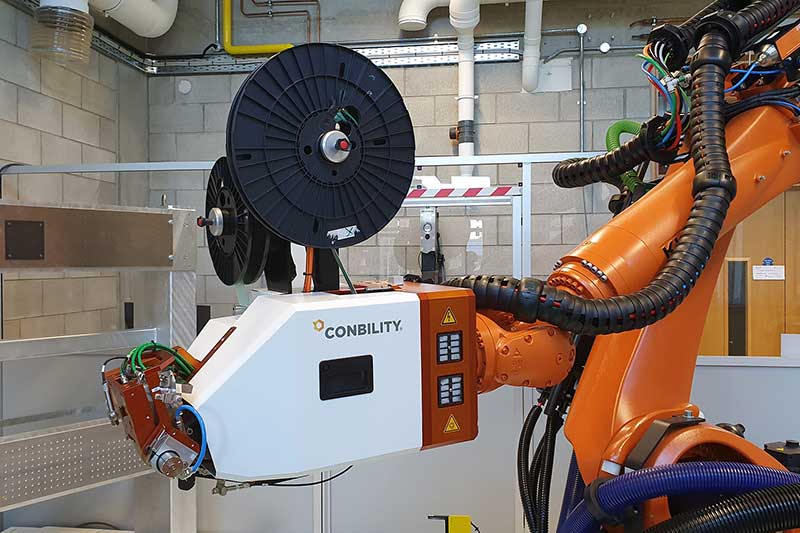
New, silicone-free, treaded vacuum cups, developed in the company’s unique bright yellow color, are its newest iteration in cup design. The 80° Shore cups offer a larger gripping area, higher gripping forces and the flexibility to adjust to uneven formed parts or parts with edges in steel, aluminum or plastic materials.
Called the PFG Series, these cups are designed with an oil displacement lip on the outer edge and brake rib arrangement that ensures oil and dirt are properly dispersed for better gripping capability. Featuring a thin, hard shape, these cups also resist deformation and offer high stability and durability.
The series have a vertical stroke holding rate of 351 N and lateral force of 193 N, making them extremely well-suited for high speed application. They are suited for continuous use within temperature ranges from -30° to 100° C (86° – 212° F), and short term use up to 125°C (257° F).
Weighing only 75g with a one-part body design, the PFG cups are very easy to exchange. Additionally, single-body feature means less damage to metal sheets as compared to other designs. The cups are available in round or oval shapes and work with pin or ball connection adapters in various designs made of aluminum and steel.
With more wear-resistance and longer service life than an NBR cup, PFG cups show hardly any signs of wear after 4,000,000 strokes. Made of thermoplastic polyurethane (TPU), the PFG cups are recyclable.
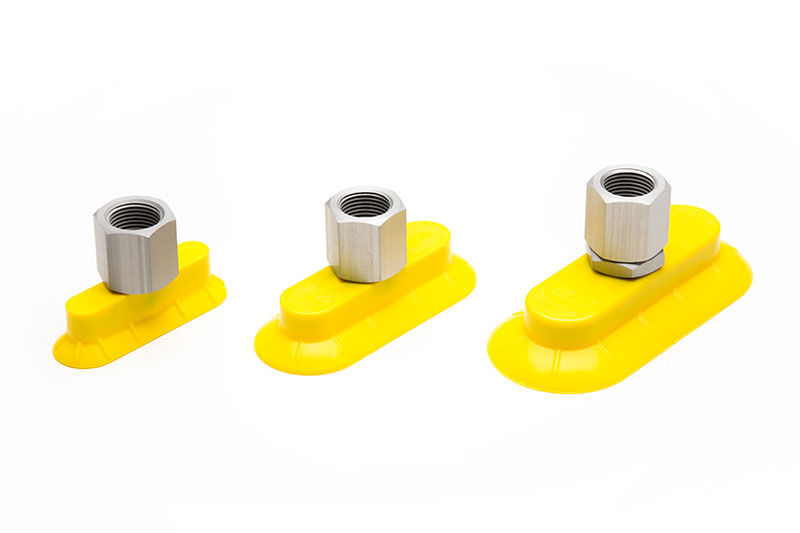
Now available, a 25” x 16.5” two-sided, laminated, Vacuum Cup Reference Chart for use on the shop floor. Designed as a quick reference tool, the guide enables users to quickly access information regarding selection of the most appropriate Bilsing traction cup for various pressroom applications. It features vacuum cup images along with an accompanying chart that provides ‘at a glance’ information on sizes, full and shear force ratings, and performance characteristics.
On the reverse side is a CupFinder chart that provides real-size vacuum cup templates so that users can lay their cup on an outline to select the cup size and shape, and then pick the connector from the illustrated cup mountings. Once these parameters are selected, a cup ordering reference string explains how to easily designate the order.
The guide is laminated to provide extra durability and features grommets that enable it to be attached to a fence line for convenient reference and visibility. Additionally, if a customer has internal standard order codes for Bilsing cups the guide can be customized by adding a column to the chart featuring these codes.
We have implemented an EHLA laser cladding process using high-speed Laser Metal Deposition (LMD) that helps protect components from corrosion and wear. As compared to hard chrome plating, thermal spraying and traditional LMD, EHLA provides an economically feasible and environmentally friendly alternative for coating surfaces in less time. This technology has already shown reliability in producing coatings – with different material combinations — for brake discs in automotive ICE or e-mobility applications.
Bilsing has mounted the laser beam source along with the EHLA processing head and powder feed system on a mobile robot, resulting in a mobile EHLA station that can move to wherever it’s needed in the workshop. This EHLA service is provided at Bilsing Automation Tic. Ltd. Sti., located in Bursa, Turkey
Developed by the Fraunhofer Institute for Laser Technology ILT and the RWTH Aaceh University, EHLA is an extremely high-speed LMD process where the laser melts the powder particles above the melt pool. Fast and reliable, it applies 25 to 250 micrometer thin layers at a speed of up to 500 meters per minute in an economical and chemical-free manner.
Bilsing has previously worked with Fraunhofer ILT on laser hardening of tools and the use of the LMD on titanium components for the aircraft industry. The company is also using a new “HighNo” (High Quality Powder Nozzle”) coaxial nozzle developed by Fraunhofer ILT and the company Harald Dicker specifically for the EHLA process, which demands extremely precise application of the powder particles. Bilsing has used the HighNo to produce a number of its proprietary products, including flexible grippers, handling devices, and forming tools.
EHLA Benefits
A significant advantage of EHLA lies in its low heat input. While the heat generated in traditional LMD affects a zone measured by the millimeter, EHLA’s thermal effect on the material is only in the micrometer range. EHLA thus makes it possible to coat heat-sensitive components, which has previously been impossible due to the resulting brittle phases. This process can also be used for entirely new material combinations, such as coatings on aluminum-base alloys or grey cast iron. It is scalable and can be used to fabricate or repair parts measured in millimeters to meters.
As compared to other technologies, the advantages of EHLA are clear. Hard chrome plating consumes a lot of energy and uses chemicals harmful to the environment. Thermal spraying consumes a lot of material and gas since only about half of the material actually lands on the component and it requires several layers of coating. Traditional LMD is too slow for large components. EHLA eliminates these drawbacks in an effective and economical way.
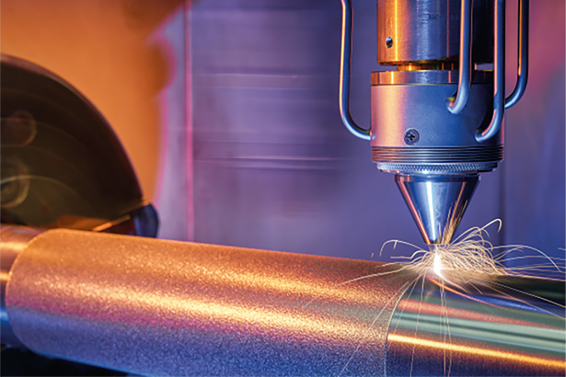
We are pleased to announce the availability of our servo-controlled Carbon Fiber (CF) T-Beams designed for high speed tandem presses. Offering interchangeable tooling, the T-beams deliver speed and flexibility to the automotive stamping industry, where there is an increasing need to handle multiple parts produced from a single stamping die. The T-beams meet the dimensional specifications and requirements of General Motors World Tooling Standards as well the ability for adaptation to any robotic application.
As compared to other tooling materials, the Bilsing CF T-Beams are approximately 70% lighter than steel and 25% lighter than aluminum solutions, as well as being dimensionally smaller. Bilsing carbon fiber tooling provides 3.5 times the stiffness of steel tooling at less than half the weight. Additionally, the high elastic stiffness of the Bilsing carbon fiber T-beams significantly reduces vibration and deflection to settle more rapidly and provide higher precision as compared to other materials. This allows for a smaller press opening during the stamping process. These features result in significant benefits such as improving production rates by up to 20 percent, less wear and tear on machine parts and lower capital equipment investment through use of smaller robots and servo drives.
Over its lifespan, carbon fiber tooling can provide a higher ROI when considering that users can get more parts out the door, reduce energy costs due to moving less tooling mass, and extend equipment life since the lighter mass of carbon fiber puts less stress on automation, robots, presses, etc.
Bilsing has proven success in replacing traditional aluminum or steel structures in a variety of applications with carbon fiber tools that meet dimensional and performance specification requirements as defined by various OEM or governing organization standards. The company offers a wide variety of CF profiles, including customized profiles for specific applications.
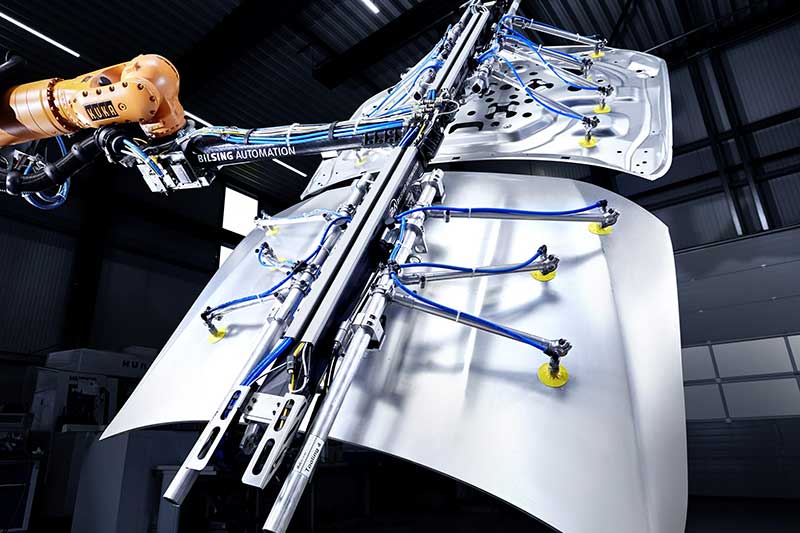
Bilsing Automation North America, a leading supplier of automated tooling and material handling solutions, has announced the addition of Visionary Manufacturing Solutions (VMS), headed by Hunter Coe, to its dealer network for the Eastern United States and Canadian territories.
“Hunter has put together an impressive list of companies offering a full array of solutions for the metal forming industry,” said Thomas Garant, general manager at Bilsing. “We are excited about being represented within the context of a comprehensive customer solution provided through this VMS network.”
“Bilsing’s industry-leading lightweight and modular tooling systems nicely enhance our offerings,” said VMS’ Hunter Coe, “We are especially eager to promote their carbon fiber solutions, which have proven to significantly impact production rates.”
Capability offered by the VMS-represented companies includes stamping presses, coil processing equipment, pressroom automation and tooling, roll forming equipment, pipe and tube mills, machine componentry, control’s and electrical services.
Bilsing Automation North America is a subsidiary of Bilsing Automation GmbH in Attendorn, Germany, which has over 30 years’ experience in automotive stamping and body-shop applications, as well as developing material handling solutions for injection molding, fabrication, packaging, hydroforming and non-automotive applications. The company is focused on providing optimum product performance that results in cost reductions, supporting the customer through planning, design, engineering, assembly and commissioning. Bilsing Automation also offers carbon fiber solutions, 3D digital simulation, optimization and on-site training as part of its service offerings.
We recently expanded our offering to include the addition of laser metal deposition (LMD), an additive manufacturing process also known as laser cladding, to our service offerings for the repair of aviation components such as landing gear bearing rings and automotive stamping or casting dies. As compared to traditional cladding processes, such as thermal spray or arc welding, LMD provides a better metallurgical bond, enhanced corrosion protection, a smaller heat affected zone and less distortion.
In this additive manufacturing process, material is added to worn or corroded surfaces or new features to accommodate design changes. Metal powder is fed into a laser beam, which is scanned across a surface where it deposits powder material in a precise web-type formation. Components or tooling can be modified or repaired without having to reproduce the entire part.
The technology is scalable and can be used to fabricate or repair parts measured in millimeters to meters. Additionally, it provides faster and more cost-effective repair. Additionally, it is an environmentally-friendly process.
This service is provided at Bilsing Automation Turkey, which holds aviation industry certifications in EASA Part-145, FAA 14 CFR 145/43, GACAR Part 145/43 and SHY Part 145. Interested companies should call +902 242 113 376
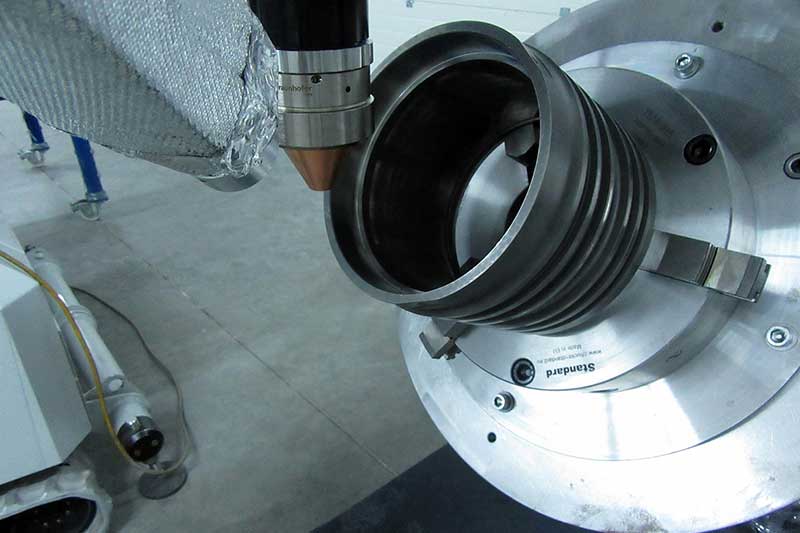

As part of this four-year program, Bilsing Werkzeugbau’s organizational structure and production processes, along with those of other participating partners, is being analyzed and documented through defined statistical procedures, and then incorporated into an APS system in an agile and iterative approach.
This project stemmed out of the impact of the move toward Industry 4.0, which is increasing data acquisition and the complexity of APS systems. As a result, many companies don’t use APS, replacing them with more traditional plans or resorting to previously used common processes. The goal is to significantly reduce complexity, better support staff in real-time data use and decision-making, and quickly adapt the APS system to both users and developers.
There were several identified stages throughout the project beginning with the documentation and modelling of Bilsing Werkzeugbau’s current production processes. In particular, there was a focus on the physical flow of workpieces through the individual production steps and the involvement of all resources, such as machines, employees, tools and materials and their interdependencies.
The project involved several workshops for Bilsing management, as well as all employees, who were tasked with collecting their own organizational structure and processes within their Production Planning System (PPS). They were then tasked with running their facility as defined by this plan, observing any gaps that needed to be addressed. It analyzed two objective functions, minimizing overall delays across all production orders or minimizing the total duration of a production plan.
FUNDING AND PARTNERS
The project EKPLO is funded by the state of North Rhine-Westphalia and the European Union. It is carried out by the Institute for Information Systems, Professorship for CSCW and Social Media of the University of Siegen, Siegen Mittelstandsinstitut of the University of Siegen, the Department of Management Information Science of the University of Siegen, the QOSIT Softwaretechnik GmbH, the tesyo technologies GmbH, the ALU-Technik Attendorn GmbH, AVENTUM GmbH and Bilsing Automation GmbH.
We now offer a new swivel unit tooling for use in the pressroom, a flexible solution to address the trend of reducing the number of operations in a press line by producing more parts via a single stamping. Whereas most products can only be used at a specific tilting angle, our swivel tooling is a universal solutions that can be adjusted to the exact degree required to grip and handle parts for each application. Additionally, as compared to other offerings, our unit is 30% lighter for improved production rates and longer tool life.
The swivel unit offers a swivel angle of +/45° (90° max) and a compact design which is 20% smaller than other offerings for improved accessibility even in difficult-to-reach, tight applications. The swivel angle is easily readable on a scale located on the top of the unit. Used as a single tooling unit, it weighs 3.6 kg (7.94 lb.), or a connecting bridge can be used to create a double swivel unit with synchronous operation and weighing 7.6 kg (16.7 lb.).
The swivel unit offers a holding force of 35 Nm with speed that is adjustable via air exhaust restrictors. The end stops feature dampening shock absorbers to slow down and reduce the vibrations during motion. Optional features include censoring that will automatically detect the angle position and a shut-off valve that locks the tilting position angle during installation and removal to ensure operator safety.
Designed for flexibility, the swivel units work with Bilsing’s lightweight carbon fiber and aluminum modular tooling as well as its entire line of vacuum cups.
